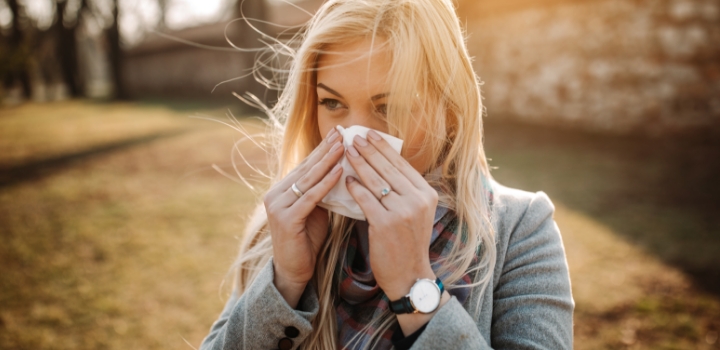Protect yourself and your loved ones against RSV infection and flu

Recently another respiratory virus made headlines internationally. We're talking about the respiratory syncytial virus (RSV) which surged jointly with flu and COVID-19 in the United States of America (USA) during their winter months. RSV season starts in February in South Africa as this virus is usually most active during autumn and early winter.
Following the relaxation of COVID-19 restrictions in many countries across the globe, a return of seasonal respiratory viruses such as common cold viruses, Respiratory Syncytial Virus (RSV) and influenza viruses was observed in 2022. This followed a period of almost no reported cases especially during the peak of the pandemic.
The RSV season is upon us, starting in February in South Africa as this virus is usually most active during autumn and early winter. It is therefore important to be aware of what to look out for and what actions to take to prevent the spread of the RSV infection and to protect yourself and your loved ones from getting infected.
RSV causes infection of the respiratory tract including the lungs
Respiratory syncytial virus (RSV) is a respiratory virus that usually causes mild, cold-like symptoms. Most people recover in a week or two, but RSV can also cause serious illness. Virtually all children have had an RSV infection by the time they turn two years old.
RSV is the most common cause of bronchiolitis (inflammation of the small airways in the lung) and pneumonia (infection of the lungs) in young children.
Persons who are most affected by RSV
RSV especially affects children younger than five years old, older adults and people living with various chronic illnesses.
RSV can cause severe infection in some people, including:
- Infants (babies of 12 months and younger), especially premature infants.
- Older adults
- People with heart and lung disease
- People with weakened immune systems (immunocompromised)
- RSV can also worsen some of the chronic lung and heart conditions such as asthma, Chronic Obstructive Pulmonary Disease (COPD) and heart failure.
The signs and symptoms of RSV
Infants who get an RSV infection almost always show symptoms. This is different from adults who can sometimes get RSV infections and not have symptoms. RSV may not be severe when it first starts. However, it can become more severe a few days into the illness.
Early symptoms of RSV may include:
- Runny nose
- Decrease in appetite
- Cough, which may progress to wheezing or difficulty breathing
- Sneezing
- Fever
In very young infants (less than six months old), the only symptoms of RSV infection may be:
- Irritability
- Decreased activity
- Decreased appetite
- Apnoea (pauses in breathing of more than 10 seconds)
How to prevent RSV infection and the flu
Vaccines and vaccinations to prevent and lessen severity of infections
There is currently no approved vaccine for RSV. Discovery Health Medical Scheme funds for palivizumab (Synagis) for certain infants who are at high risk for severe disease from RSV.
Luckily, there are vaccines for influenza (flu shots). Every year they update the flu vaccine to protect us against the main strains of influenza viruses that research shows will be most common during the upcoming season. It's a good idea to get the flu shot every year. Discovery Health Medical Scheme pays for a flu shot from your Screening and Prevention benefit if you are at high risk for severe disease. You can learn more about your cover from the Screening and Prevention Benefit here.
Also make sure you are up to date with your COVID-19 vaccines and boosters to protect yourself from severe COVID-19 infection.
Measures to prevent spreading of respiratory viruses
If you have contact with infants, young children and other people who are at risk of severe disease, do your best to keep them healthy. RSV and influenza are respiratory viruses, like COVID-19, so we can do the same things to prevent spreading of these viruses. Here is a reminder:
- Wash your hands often with soap and water for at least 20 seconds or use an alcohol-based hand sanitizer.
- Keep your hands off your face - avoid touching your eyes, nose and mouth with unwashed hands.
- Avoid close contact with sick people, kissing and sharing cups or eating utensils with people who have cold-like symptoms.
- Cover your mouth and nose with a tissue or your upper shirt sleeve when coughing or sneezing. Throw the tissue in the trash afterward.
- Clean and disinfect surfaces and objects that people frequently touch, such as toys, doorknobs and mobile devices.
- Stay home when you are sick - stay away from work, school and public areas. This will help protect others from catching your illness.
- Vaccinate - get vaccines which are available to you- i.e. COVID-19 and influenza
How to treat RSV infection
There is currently no cure or treatment for RSV, other than supportive treatment and symptom control.
For milder cases, doctors usually try to control the symptoms. For more serious cases, people might need hospitalisation with supporting oxygen, hydration and medicine to control symptoms.
Resources
- www.nbcnews.com/health/health-news/rhode-island-pediatric-beds-are-100-full-surge-respiratory-viruses-rcna56019?campaign_id=154&emc=edit_cb_20221109&instance_id=77083&nl=virus-briefing®i_id=117152639&segment_id=112657&te=1&user_id=eedbb529472f933a8c369d85077c83a1
- www.vox.com/science-and-health/23453765/flu-season-2022-2023-winter-influenza-shot-vaccine
- www.cdc.gov/rsv/index.html
- www.mayoclinic.org/diseases-conditions/respiratory-syncytial-virus/symptoms-causes/syc-20353098
The Discovery Health Medical Scheme is an independent non-profit entity governed by the medical schemes act, and regulated by the Council for Medical Schemes. it is administered by a separate company, Discovery Health (Pty) Ltd, an authorised financial services provider.